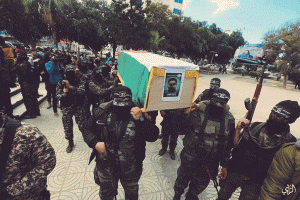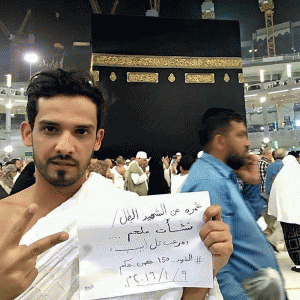Palestinian social media initiative fails to catch on among Israeli Arabs
In the real world, Nashat Melhem, who killed three people in a shooting spree in Tel Aviv on January 1, was buried in a small, quiet funeral in his hometown, the Galilee village of Arara, late on the night of January 12th.
About 80 people were estimated to have taken part, but Melhem’s father, Mohammed, a volunteer cop who was under house arrest at the time, chose not to attend.
In general, both the town and Melhem’s family have reacted to Nashat’s act with regret and shame, even horror.
In the Palestinian Twitterverse, however, Melhem is enjoying a voracious afterlife as a hero of the “al-Quds Intifada,” or the “Intifada of Knives,” names used to describe the outburst of violence that has cost about 30 Israeli lives and 149 or 150 Palestinian lives since early October.
Why the discrepancy as to the exact figure?
The Palestinian Authority has not yet formulated a unified public response to the spate of violence in which Palestinian youngsters (and a few adults) have taken it upon themselves, with no formal organization, to perpetrate stabbings and car rammings (and Melhem’s shooting spree) against Israeli soldiers and civilians.
Tal Lev-Ram, Israel Army Radio’s Palestinian Affairs correspondent, reported that Israeli security officials interviewing some of the perpetrators in jail and asking if they were inspired by what the Israeli government calls President Mahmoud Abbas’ “incitement against Israel,” were met with blank faces and the response “who’s he?”
The Palestinian Ministry of Health initially listed Melhem as a “martyr,” making him number 150 on the list of Palestinians killed in clashes with Israelis since October. Subsequently his name vanished from the list, and the shahid (martyr, in Arabic) quota reverted to number 149.
This holiday season, give to:
Truth and understanding
The Media Line's intrepid correspondents are in Israel, Gaza, Lebanon, Syria and Pakistan providing first-person reporting.
They all said they cover it.
We see it.
We report with just one agenda: the truth.


The zigzagging “angered the Palestinian street,” reported Al Jazeera, “and the anger is reflected across social media platforms. Activists have expressed their fury at the move.”
This is not the only item related to Melhem that has disappeared into the ether.
The new Galilee-based Arabic-language website Barq—Lightning—published an item about a baby named in honor of “the legendary hero Nashat.” Initially, the website announced that the baby was born in Arara, Melhem’s village. The item was picked up by the aggregator site bittna.com [2] carrying that detail.
“The Al Barq family congratulates you on the new baby,” the item concluded.
But whoever wanted to give the impression that Melhem’s village was now honoring his memory got it wrong. Barq’s owner told The Media Line that the family that sent the website pictures of the baby in order to publicize their identification with Melhem is, in fact, from Gaza.
Gaza is also where an alternate funeral was held for Melhem, with armed young men, their heads wrapped in keffiyehs, parading in the streets with an empty coffin, in broad daylight, to honor him in a way that his quiet, dark Galilee burial failed to do.

Gaza “funeral” for tel Aviv shooter Nashat Melhem. (Credit: Twitter feed of @Khair_Aljabri )
Ashraf Shannon , the Gaza correspondent for Iran’s official PressTV, reported on “a symbolic funeral held in Gaza for a Palestinian man who was killed by Israeli forces in the Israeli town of Arrarah,” and whom, according to him, Palestinians consider “a hero who was killed while fighting against Israeli aggression.”
On January 1, 2016, Melhem shot and killed two young Israeli men in a popular downtown Tel Aviv café, and then, using the same weapon he had stolen from his father, killed an Israeli Arab taxi driver who, according to reports in the Israeli media, refused to drive Melhem to the West Bank.
In a conversation with The Media Line, Hussein Abo-Hussein, the information technologist behind bittna.com, bemoaned the fact that “the media is trying to inflame this and bring people back to an unfortunate event, or to something that isn’t even true, when what really should be reported is the inequality that the Arab sector in Israel is suffering, all the factors behind these events.”
In their attempt to promote Melhem as a hero of this new uprising, Palestinian cyberverse activists deployed two hashtags: the first, #انتفاضه _القدس, meaning #alQudsIntifada, and the second, #الشهيد_150_غصبن_عنكم, aimed directly at the Palestinian leadership, meaning #Shahid150inspiteofyou.
Al Jazeera quoted an activist called “Khalil” who tweeted that the Palestinian Ministry of Health was merely submitting to Israeli pressure by removing Melhem’s name from the official list of martyrs, adding that “your certificate is not a monopoly.”
One image widely replicated on Arabic-language Twitter feeds shows a young man on pilgrimage to Mecca, making a peace sign with one hand, while the other holds up a sign reading “Pilgrimage on behalf of the hero martyr Nashat Melhem,“Tel Aviv terrorist” #Shahid150inspiteofyou.”

Another image widely shared among Palestinian activists shows a regally bearded Melhem framed by the circle of the number 0, and the hashtag #alQudsIntifada.
In recent weeks, tens of thousands of Palestinians have attended (real) West Bank funerals for Palestinians killed in the recent violence whose bodies were held by Israeli authorities in the hopes of preventing their burials from turning into mass events in support of terror.